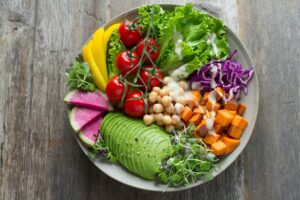Eating for Beauty

In the pursuit of radiant beauty, we often turn to skincare products and treatments, but what if the key to unlocking our natural glow lies not in our makeup bags, but on our plates? Indeed, the connection between nutrition and beauty is profound, with the foods we consume playing a crucial role in the health and vitality of our skin, hair, and nails. In this beauty blog, we’ll explore the fascinating ways in which nutrition impacts our external appearance and uncover the secrets to nourishing beauty from within.
Skin: The Mirror of Internal Health
Our skin is the body’s largest organ and serves as a visible reflection of our internal health. The foods we eat can have a significant impact on the health and appearance of our skin, influencing factors such as hydration, elasticity, and clarity. Here’s how nutrition affects the skin:
- Hydration: Proper hydration is essential for maintaining skin health and preventing dryness and dullness. Consuming plenty of water-rich foods such as fruits, vegetables, and soups can help keep the skin hydrated from the inside out.
- Antioxidants: Antioxidant-rich foods such as berries, leafy greens, and nuts help protect the skin from oxidative stress and damage caused by free radicals. These nutrients can help prevent premature aging and maintain a youthful, radiant complexion.
- Omega-3 Fatty Acids: Omega-3 fatty acids, found in fatty fish, flaxseeds, and walnuts, help maintain the skin’s lipid barrier, preventing moisture loss and inflammation. Including these healthy fats in your diet can promote soft, supple skin with a natural glow.
- Vitamins and Minerals: Vitamins and minerals play a crucial role in skin health, with deficiencies often manifesting as dryness, dullness, or blemishes. Consuming a varied diet rich in vitamins A, C, E, and zinc can support skin regeneration, collagen production, and overall resilience.
Hair: From Roots to Tips
Just as our skin reflects our internal health, our hair serves as a barometer of our nutritional status. The foods we eat provide the building blocks for healthy hair growth, strength, and shine. Here’s how nutrition influences hair health:
- Protein: Protein is the foundation of healthy hair, as hair follicles require adequate protein intake to produce strong, resilient strands. Incorporating protein-rich foods such as lean meats, eggs, legumes, and nuts into your diet can support optimal hair growth and thickness.
- Vitamins and Minerals: Certain vitamins and minerals are essential for hair health, including biotin, vitamin D, iron, and zinc. These nutrients play key roles in promoting hair growth, preventing hair loss, and maintaining scalp health.
- Healthy Fats: Omega-3 fatty acids are crucial for maintaining scalp health and promoting shiny, lustrous hair. Consuming foods rich in omega-3s, such as salmon, avocado, and flaxseeds, can help nourish the scalp and enhance hair texture and shine.
- Hydration: Like the skin, the hair requires adequate hydration to maintain moisture balance and prevent dryness and brittleness. Drinking plenty of water and consuming hydrating foods such as fruits, vegetables, and herbal teas can support healthy hair from the inside out.

Nails: The Window to Internal Health
Our nails provide valuable insights into our overall health, with changes in nail color, texture, and strength often indicating underlying nutritional deficiencies or imbalances. Here’s how nutrition affects nail health:
- Protein: Protein is essential for nail growth and strength, as the protein keratin forms the structural foundation of the nails. Including protein-rich foods such as eggs, poultry, beans, and nuts in your diet can promote strong, healthy nails.
- Biotin: Biotin, also known as vitamin B7, is a key nutrient for nail health, as it supports keratin production and nail growth. Foods rich in biotin include eggs, nuts, seeds, and whole grains.
- Iron: Iron deficiency can lead to brittle, ridged nails, as iron is necessary for oxygen transport to the nail bed and matrix. Consuming iron-rich foods such as lean meats, leafy greens, and legumes can help support healthy nail growth and strength.
- Vitamins and Minerals: Vitamins and minerals such as vitamin C, vitamin E, zinc, and selenium are essential for nail health, as they support collagen production, antioxidant defense, and overall nail resilience.
Incorporating Beauty-Boosting Foods into Your Diet
Now that we’ve explored the ways in which nutrition affects the skin, hair, and nails, let’s talk about how to incorporate beauty-boosting foods into your diet:
- Eat a Balanced Diet: Aim to consume a varied diet rich in fruits, vegetables, whole grains, lean proteins, and healthy fats. This will provide a wide range of nutrients to support overall health and beauty.
- Focus on Nutrient-Dense Foods: Prioritize foods that are rich in vitamins, minerals, antioxidants, and healthy fats, such as berries, leafy greens, nuts, seeds, fatty fish, and avocado.
- Stay Hydrated: Drink plenty of water throughout the day to maintain hydration and support skin, hair, and nail health. Herbal teas, infused water, and hydrating foods such as cucumbers and watermelon can also contribute to your daily fluid intake.
- Supplement Wisely: In addition to a balanced diet, consider supplementing with targeted vitamins and minerals to address specific beauty concerns. Consult with a healthcare professional to determine the appropriate supplements for your needs.
In conclusion, the foods we eat play a crucial role in the health and vitality of our skin, hair, and nails. By nourishing our bodies with nutrient-dense foods rich in vitamins, minerals, antioxidants, and healthy fats, we can support optimal beauty from the inside out. So, why not embrace the power of nutrition and unlock your natural radiance, strength, and vitality? Your skin, hair, and nails will thank you for it.




